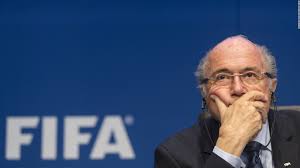By Andrew Warshaw in Zurich
July 20 – Sepp Blatter’s often tempestuous and acrimonious reign as FIFA president will finally come to an end on February 26 next year, the date set today for an extraordinary congress to elect his successor after what will be almost 18 years in charge.
The embattled Swiss, who first joined FIFA in 1975, will be replaced just two weeks short of his 80th birthday, bringing the curtain down on a long and controversial career that split global public opinion and will be terminated nine months into his short-lived fifth term.
Just days after he was re-elected at the end of May, Blatter reluctantly agreed to step down in the wake of the two bombshell corruption probes that continue to shake FIFA to its roots.
Under the rules, candidates have up to four months before the election to declare they are standing.
That means October 26 now becomes a pivotal date in terms of knowing the full list of those bidding to take over – though most will throw their hats into the ring far earlier, with UEFA president Michel Platini likely to be the first, possibly within the next couple of weeks.
UEFA reportedly wanted the election to take place in mid-December whilst there have previously been calls for Blatter to step down immediately.
Instead he will remain in charge another seven months and will use the time to play a key part in bringing about much-needed reforms, many of which have long been kicked around but have invariably ended up in the stands, metaphorically speaking, because of old-school vested interests.
Blatter’s eagerly awaited first press conference since dramatically announcing, ashen-faced, that he had decided to end his mandate (he has never used the word resign) got off to an inauspicious start.
Just he sat down looking far more relaxed than the last time he addressed the international media, a protestor – understood to be a professional British prankster who somehow broke through security – went up to him and threw a wad of fake banknotes over his head. Clearly startled, Blatter walked out until the area was cleared.
When he returned 10 minutes later, it was made clear he would not, for legal reasons, be answering any questions on either of the ongoing US and Swiss corruption investigations, instead focussing on a series of reform measures to pull FIFA, under increasing pressure from its sponsors, back on an even keel.
As anticipated, the measures, delivered to the exco by Domenico Scala, independent chairman of FIFA’s audit and compliance committee, will include term limits, integrity checks for exco members, disclosure of salaries plus future World Cup bidders having to abide by United Nations standards on human rights.
Crucial to the process is the agreement to set up an 11-member reform Task Force to monitor FIFA’s governance, with an independent chairperson from outside football and comprising representatives from all six confederations.
But no date was given for exactly when the reforms will come into effect.
“It’s a very important day for the world of football,” said Blatter, who almost looked like his old self as he positioned himself to take the moral high ground in front of a packed auditorium.
It was almost as if nothing had happened in the intervening weeks. But Blatter knew it had and was repeatedly asked exactly why he announced on June 2 he was to step down.
“The pressure was coming from different groups attacking FIFA including the president,” he said. “I had this on my conscience. I wanted and still want – and this is my prerogative and my duty – to defend not myself, I can easily do that, but the institution of FIFA.”
It was classic Blatter and it continued as he looked ahead to the last few months of his tenure. “After the tsunani on May 27 came to Zurich, have the waves taken me away? Not at all, not at all. I get the impression I am still alive.”
Pressed on whether he might stand again, he re-iterated that new is new and that he is the “old, or not so old” president.
Alive, too, to all kinds of speculation about what he might do after he leaves. One of his ambitions, much to the surprise of reporters, is to go back to his journalistic roots, this time as a radio broadcaster.
“On February 26 FIFA will have a new president and I think I will go back to my hobby. Radio is the most important information tool because it’s for 24 hours and everyone can listen anywhere in the world. Besides, it’s easier to speak than to write.”
“I hope somebody will be happy to listen to my voice.”
Contact the writer of this story at moc.l1745645726labto1745645726ofdlr1745645726owedi1745645726sni@w1745645726ahsra1745645726w.wer1745645726dna1745645726

